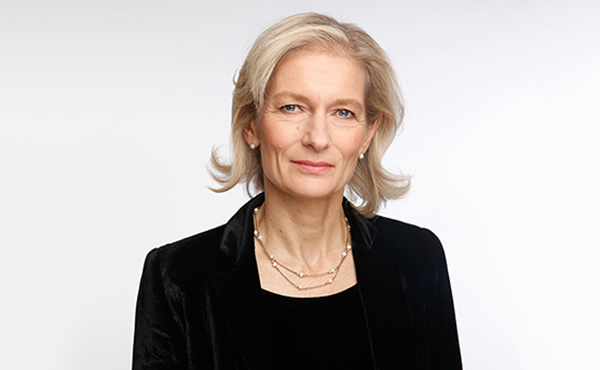This past Wednesday, Sept. 27, Fairfield University hosted world-renowned journalist, Zanny Minton Beddoes. As Editor-in-Chief of “The Economist Magazine,” Ms. Beddoes is sought after for her insight on international political issues and macroeconomic trends. In her lecture, she sought to speak to the future generation of leadership as she synthesized the most meaningful global shifts of the past three decades and prepared the audience for the pivotal changes that will shape the future geopolitical sphere.
Ms. Beddoes divided her lecture into two distinct segments, each with four subcategories. The first segment addressed seminal global trends since the 1990s, and the second touched on emerging trends that will likely rise in prominence in the near term.
A glaring and historically unprecedented example of economic growth is the emergence of China as a world superpower. Ms. Beddoes equates China’s integration into the world economy as a shock whose magnitude was equivalent to the technological revolution in its transformation of the world order.
In recounting her numerous travels to China, Ms. Beddoes explained that throughout the years, “you could see the pace of prosperity.” Cities and ports were expanding at an unparalleled pace, and per capita living standards were increasing alongside this industrialization. However, Ms. Beddoes qualifies that since Xi Jinping’s rise to power, China has become “decidedly more authoritarian”. This has stymied Chinese growth, and Ms. Beddoes believes that never again will we see such a rapid pace of economic expansion.
One of the most acute challenges of the modern era is climate change. Since the establishment of the Intergovernmental Panel on Climate Change (IPCC) at the behest of the United Nations in 1988, countries have struggled to formulate an effective and binding solution to the climate crisis. In recounting a personal example of climate change in action, Ms. Beddoes recalls her time in Mali, a sub-Saharan African country whose depletion of resources has led to inter-group conflict. Warring factions have emerged in a fight for water as climate change has dried up once fertile areas. Ms. Beddoes emphasizes both the environmental and security risks the world will face as the planet continues to warm.
The digital revolution has transformed the world order to a level on par with the industrial revolution. From an economic perspective, Ms. Beddoes notes the extensive wealth that digital technology has created and how its rapid evolution has caused “enormous disruptions in the job market.” The ease with which information is spread and accessed has led to increasing global interconnectedness, yet it has also been “a huge driver of some polarization.” Computers, the internet, social media and now artificial intelligence will continue to transform how we operate, communicate and engage in innovation.
Noticeable demographic shifts will change how countries allocate their resources in response to an aging population. Fertility rates in many predominantly developed countries have plummeted. Ms. Beddoes states: “In 2000, the fertility rate was 2.7 which is above the replacement rate of 2.1. Today, it is 2.3 and falling rapidly.” The replacement rate refers to the number of children born per woman that allows the population to replace itself from one generation to another.
To quantify how this will impact world demographics Ms. Beddoes notes, “outside sub-Saharan Africa, the world population will peak in 2050 and be smaller than it is now in 2100.” These numbers speak to an aging population where countries must account for a decrease in people of working age and an aging population requiring further medical care.
While the above-mentioned trends touch on major shifts from the past three decades, Ms. Beddoes notes four specific changes that have arisen in the past twelve years whose impact permeates into today.
The Coronavirus pandemic, beginning in 2020 changed many aspects of life. The near-total shutdown of the world led to increased public spending and “an overall mindset change in government to focus on resiliency and preparation.” Even today, countries are trying to figure out what a new normal means in a post-COVID environment.
February 2022 saw the start of the biggest land war in Europe since World War II. As countries have taken sides in the Russia-Ukraine conflict, there has been “an increased gap between the West and the rest as Western countries have rallied behind Ukraine.” Since Ukraine is a global commodity producer, the increase in food prices has reverberated throughout the world. The effects of this ongoing conflict will continue to be felt at home.
In tandem with changes in food prices, changes in the organization of global energy markets have occurred as a direct result of the Russia-Ukraine War. Ms. Beddoes explains how Russia, a traditionally big energy producer, has been stalled by economic sanctions. European countries have begun to acquire energy elsewhere. This has led to heightened inflation and a search for alternative green energy sources.
Ms. Beddoes concluded by drawing the audience’s attention to “what will be a transformation far bigger than the internet and the phone.” The impact of artificial intelligence, according to Beddoes, will be significant, and it will act as “a multiplier for human ingenuity,” in accelerating medical inventions and causing meaningful changes in many sectors of the global economy.
Ms. Beddoes holds that the changes she has summarized will greatly transform individual economies and the world at large. She believes that trends in the political economy necessitate meaningful revisions in leadership. “We must change the way that we run our societies in order that we may cope with and maximize the changes of the twenty-first century.”


Leave a Reply